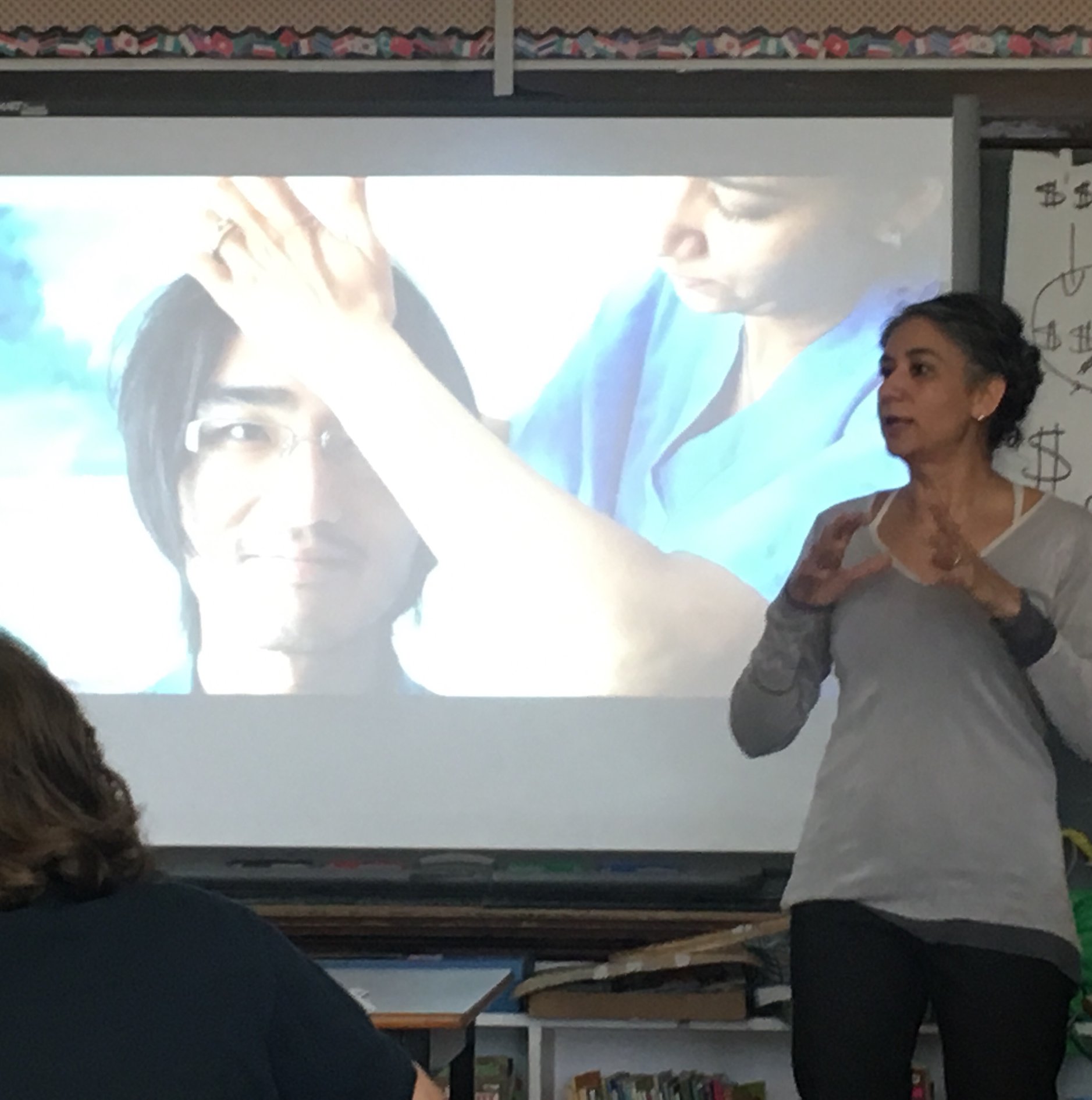About me
Ruhi Snyder is the founder of Naptor. She is an Independent Sleep Researcher and Educator. Ruhi has been in the field of sleep medicine for the past twenty years- as a board registered polysomnographic technologist (RPSGT), who is also certified in advanced clinical sleep health. She has also served as an administrator, teacher and educator. She is currently at Kingston General Hospital’s Sleep Disorders Lab, Kingston Health Sciences Centre, where she works in assessing and evaluating sleep disorders, implementing therapeutic interventions, and educating patients.
In 2011, after years of helping others improve the quality of their sleep, Ruhi began looking critically at the negative impact of the shift work entailed in her job. Concerned about the effect it was having on her health and well being, she embarked on a longitudinal self-case study, collecting subjective and objective data over the course of more than nine years to better understand the impact of an erratic sleep schedule. As part of her research, Ruhi created an experimental program/s exploring how self-regulation, notably physical exercise in the form of high intensity interval training, diet, intermittent fasting and meditating might counteract the negative effects of shift work. She embraces the notion of shift work as an act of “slow violence”, a term borrowed from Dr. Rob Nixon, Professor of Humanities and the Environment at Princeton University. Slow Violence describes the catastrophic effects of environmental deterioration and its invisible trauma on human beings. “As shift workers,” she has said, “We commit slow violence against ourselves.”
Ruhi approaches the subject of sleep as a practitioner and parent. Viewing the subject through both a political and economic lens, she is fascinated by the way sleep impacts nearly every aspect of our lives – from our mental health, to the ways we learn, retain information, regulate hormones, and age among many other mental and physical functions. Ruhi regards quality sleep as preventive medicine and critical for health.
A passionate educator, Ruhi has presented her research at the World Sleep Congress in Vancouver, Kingston Nursing Research Conference at Queen’s University, International Symposium on Shift Work and Working Time in Uluru, Australia, and the Canadian Sleep Society Conference in Toronto, among other venues.
A sought-after speaker, Ruhi Snyder has been delivering interactive sleep workshops since 2014 in various Elementary, Middle and High Schools across Ontario as a part of her outreach on preventive medicine. In 2018, she founded Naptor, a not-for-profit organization committed to delivering evidence-based educational workshops on sleep health for children, youth and adults.
Ruhi’s research is in preventive medicine, including shift work and working time, sleep in pre-adolescents and adolescents. Her current focus is educating pre-adolescents and adolescents about the importance of sleep, health and well being. Her other projects include an ongoing case study on “The Role of Self-Regulation to Counter the Slow Violence of Shift Work”. She is also involved in “Sleep Nap Study” at Davies 4 ICU unit at Kingston General Hospital, Kingston Health Sciences Centre.
ruhisleep.ca is home to the Sleep and Society Podcast, a bi-weekly podcast where Ruhi talks about different topics around sleep and society. Visit the Sleep and Society Podcast for more.
Publications
-
2021
A Shift Workers Guide to Sleep and Wellbeing
Women Aspire Together Magazine 2 -
2019
The Economics Of Self-Regulation to Counter the Slow Violence of Shift Work: A Case Study
Sleep Medicine, Volume 64, Supplement 1, December 2019, Page S360 -
2019
Field Observations on Current Patterns of Sleep in Adolescents.
Sleep Medicine, Volume 64, Supplement 1, December 2019, Page S360 -
2019
Implementation and Evaluation of a Nap-at Night Intervention for Front-Line Hospital Staff in Critical Care.
Volume 64, Supplement 1, December 2019, Page S97 -
2017
The Role of Self-Regulation and Shift Schedule to Counter the Slow Violence of Shift Work: Field Notes from the Front Line
Working Time Society, 23rd Symposium, 2017 -
2015
The Role of Self-Regulation and Shift Schedule to Counter the Slow Violence of Shift Work.
Canadian Sleep Society Conference, 2015
Invited Speaker Examples
Based on a 9 year longitudinal case study, this presentation explored the many challenges and dilemmas faced by shift workers in trying to mitigate the negative consequences of shift work in terms of sleeping, eating and exercise. It explored the gap between analysis and praxis.
Kingston General Hospital, Kingston Health Sciences Centre. Kingston, Ontario (Illustration)
Based on a 7 year longitudinal self case study – this talk took on shift work and desynchronized sleep. It dove deep into systems that perpetuate these acts of bio-deregulation and the implications on biology, wellbeing, economy and society.
Ban Righ Centre for Women, Queens University, Kingston, Ontario, Canada. (Poster and photos and maybe the audio of introduction by Sarah)
This study looked at the cost of self-regulation in form of high intensity interval training and good diet to counter the negative consequences of shift work. It looks at data collected over 5 years going from full time with benefits to permanent part time with no benefits. The analysis looked at the cost of high intensity training in terms of professional coaches, post injury treatment and taking on preventive functional movement training in order to avoid injury. It also looked at the cost of good diet.
World Sleep Congress, Vancouver, Canada. (Poster and photo)
World Sleep Congress, Vancouver, Canada. (Poster and Photo)
This presentation discussed the current patterns and barriers to sleep in pre-teens and teens, the consequences, recommendations and real life interventions.
Kingston Collegiate Vocational Institute, Limestone District Board of Education. Kingston, Ontario, Canada. (Flyer and photos)
This presentation discussed the results of the study started at Davis 4 Critical Care Ward at Kingston General Hospital, KHSC by a working group including front-line staff for a trial implementation of a nap-at-night on night shifts and obtained feedback regarding the study protocol and its implementation
Health Quality Research Forum, Queens University, Kingston, Ontario, Canada. (Photo- On Twitter somewhere?)
This presentation discussed the current challenged faced by pre-teens and teens in regards to their sleep. It discussed the nature and the science of sleep and provided real life interventions that could help mitigate the negative effects of sleep deprivation and or restriction on the development of the amazing teen brain.
Parent Sleep Workshop, Rowntree Public School, Peel District School Board, Brampton, Ontario, Canada. (Photos)
This presentation discussed the field observations collected over 4 years of conducting sleep workshops in various elementary, middle and high schools. The data focused on the current patterns of sleep in pre-teens and teens.
Kingston Nursing Research Conference, Queen’s University, Kingston, Ontario, Canada. (Photos and Poster)
Limestone District School Board, Kingston (Krista Mather), Ontario, Canada. (Illustration)
This presentation discussed the data collected on the 5 year longitudinal self case study that examined the results of self regulation in terms of exercise in form of high intensity interval training and diet to combat the negative effects of shift work on physical and mental wellbeing.
Kingston Nursing Research Conference, Queen’s University, Kingston, Ontario, Canada. (Illustration)
This presentation showed the results of 5 years of self regulation in form of exercise and diet as a shift worker on productivity and performance at work.
23rd International Symposium on Shift Work and Working Time, Uluru, Australia. (Video)Education and Public Outreach
This interactive presentation discusses the nature, the science and the importance of sleep.
Elementary, Middle and High Schools (Grade) of Kingston, Ontario:
- Kingston Collegiate Vocational Institute, LDSB, Grades 9, 10, 12
-
- Central Public School, LDSB, Grades 5, 6, 7, 8
- Sydenham Public School, LDSB, Grades, 7, 8
- Polson Park Pubic School, LDSB, Grades, 4, 5, 6
- Vanier Pubic School, LDSB, Grades 6, 7
- Regiopolis-Notre Dame Catholic Secondary School, ALSDSB, Grade 9
- Rideau Public School, LDSB, Grades 5,6
- Rowntree Public School, PDSB, Grade 5
This presentation is based on in field data collected on how technology and media use is impacting sleep of pre-teens and teens. It dives into the consequences of excessive media use around bedtime. Based on current scientific data it shows how delayed, disrupted, and curtailed sleep impacts learning, memory and mood.
- Kingston Collegiate Vocational Institute, Limestone District School Board, Grades 9,10,11, 12
What role does sleep play in our overall wellbeing and what does it have to do with empowerment? Based on current scientific data and the Shift Work case study, this presentation looks at the importance of quality sleep on cognition and critical thinking. How good decision-making can lead to self-actualization and empowerment.
- Kingston Collegiate Vocational Institute, Limestone District School Board, Grades 9, 10,11, 12
This presentation discusses the role of sleep
This presentation discusses the important role sleep plays on our everyday activities. It introduced the audience to the science and nature of sleep and what happens to our physical and mental wellbeing when our sleep is skewed based on shift work case study.
- Keys Job Centre Services, Kingston, Ontario (Nancy McGarvie)

Other Writings and Accredited Projects:
Theory of Relativity: A Short Introduction
A Brief History of Quantum Mechanics: From Atoms to Quarks
From Precepts to Concepts: Making of a Thought
Memory: Where in the brain?
Eastern Vedantic Philosophy and the Indian Caste System
Research Interests
Sleep, Shift Work, and Working Time
Sleep in Pre-Adolescents and Adolescents
Sleep and Society
Awards
2021 – Kingston Nursing Research Conference ‘Best Poster Award”
2015 – BMO Excellence in Health Care Award
2002 – Thesis Scholarship, University of Waterloo
2001 – Millennial Scholarship, University of Waterloo
1992 – Ontario Scholar
Testimonials
“It was a very useful workshop at all times and I felt very comfortable the entire time with Ruhi”
“The presentation was very accessible and infectious! The way it was presented made it very easy for me to understand”
“This Presentation was easy to understand, Ruhi explained the presentation very well and was very passionate which made it easy to listen and engage in the conversation. I felt comfortable asking questions and feel like I will sleep more often and understand how it affects me.”
“She was easy to understand and explained concepts well. Answered questions throughout the presentation which was great because otherwise I probably would have forgotten all my questions. The visuals were very useful, and I felt very comfortable with Ruhi the entire time”
“I never really thought about sleep in this way before, it was something I just had to do but thanks to the workshop it was very easy to understand why Ruhi was saying it is so important to get a good sleep.”
“It was cool. lol. I understand about seep because I had not had any idea about sleeping is a good exercise for the body because as a human being we need to rest enough.”
“I learned to not stay up too late and to get a least 8 hours of sleep. I found the pictures of the presentation to be the best part to help me understand.”
“I think the speaker made me feel comfortable when I could ask her the question. She could answer me in a polite way. I felt the best thing about the presentation was how the speaker expressed herself and made us comfortable.”
“I liked the stages of your sleep the most from this workshop and didn’t like the bad stuff that could happen to you if you do not sleep well. I learned a lot”
“I learned to not stay up too late and to get a least 8 hours of sleep. I found the pictures of the presentation to be the best part to help me understand.”
Subscribe to Ruhi’s podcast
Lorem ipsum dolor sit amet, consectetur adipiscing elit. Morbi non orci et arcu vestibulum pellentesque. Orci varius natoque penatibus et magnis dis parturient montes, nascetur ridiculus mus.

